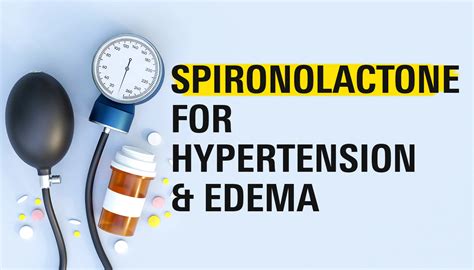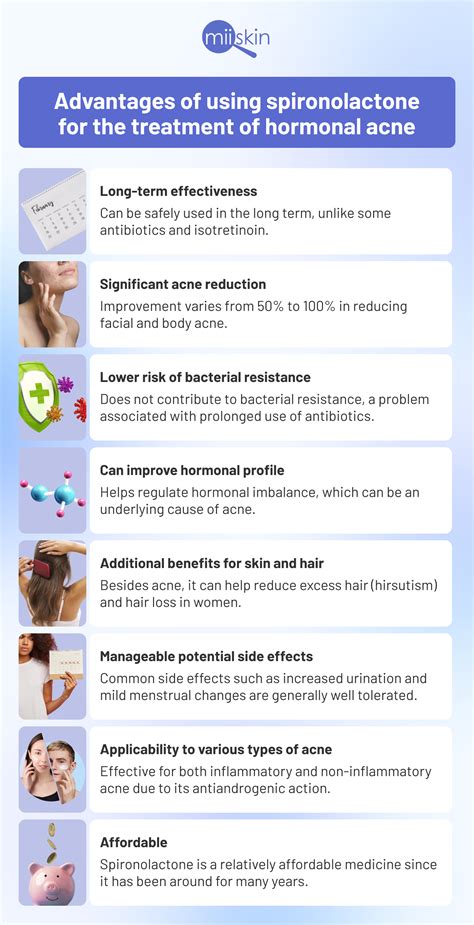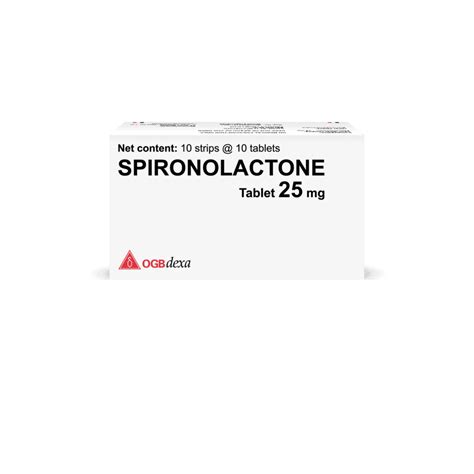Intro
Discover Spironolactones benefits, a potassium-sparing diuretic, for acne, hirsutism, and heart failure treatment, with uses including blood pressure regulation and edema management.
Spironolactone is a medication that has been widely used for decades to treat various health conditions. It is a potassium-sparing diuretic, which means it helps the body get rid of excess fluid while preserving potassium levels. This medication has been a cornerstone in the treatment of conditions such as heart failure, hypertension, and edema. In recent years, spironolactone has also gained popularity for its off-label uses, including the treatment of acne, hirsutism, and polycystic ovary syndrome (PCOS). In this article, we will delve into the uses and benefits of spironolactone, exploring its mechanisms of action, potential side effects, and the latest research on its efficacy.
Spironolactone has been a mainstay in the treatment of cardiovascular diseases, particularly heart failure and hypertension. By blocking the effects of aldosterone, a hormone that promotes water retention and blood pressure elevation, spironolactone helps to reduce blood pressure and alleviate symptoms of heart failure. This medication has been shown to improve survival rates and reduce hospitalization rates in patients with heart failure. Additionally, spironolactone has been used to treat edema, a condition characterized by swelling in the legs, ankles, and feet, often associated with heart failure, liver disease, or kidney disease.
The use of spironolactone has also been extended to the treatment of hormonal imbalances, particularly in women. It has been shown to be effective in reducing androgen levels, which can help to alleviate symptoms of conditions such as acne, hirsutism, and PCOS. Spironolactone works by blocking the effects of androgens, such as testosterone, which can contribute to the development of these conditions. This medication has been particularly beneficial for women with PCOS, who often experience symptoms such as acne, excess hair growth, and irregular menstrual cycles.
How Spironolactone Works

Benefits of Spironolactone

Cardiovascular Benefits
Spironolactone has been shown to have numerous cardiovascular benefits, including: * Reducing blood pressure and alleviating symptoms of hypertension * Improving survival rates and reducing hospitalization rates in patients with heart failure * Reducing the risk of stroke and myocardial infarction * Improving cardiac function and reducing symptoms of heart failureHormonal Benefits
Spironolactone has also been shown to have numerous hormonal benefits, including: * Reducing androgen levels and alleviating symptoms of hormonal imbalances * Improving symptoms of acne, hirsutism, and PCOS * Regulating menstrual cycles and improving fertility * Reducing the risk of endometrial cancer and breast cancerSide Effects of Spironolactone

Managing Side Effects
To minimize the risk of side effects, it is essential to follow the recommended dosage and administration instructions. Patients should also be monitored regularly for signs of side effects, such as changes in blood pressure, electrolyte levels, and renal function. In addition, patients should be advised to report any side effects to their healthcare provider promptly.Contraindications and Interactions

Spironolactone can also interact with other medications, including:
- Potassium supplements
- ACE inhibitors
- Angiotensin receptor blockers
- Digoxin
- Lithium
Precautions and Warnings
Patients taking spironolactone should be aware of the following precautions and warnings: * Monitor potassium levels regularly to avoid hyperkalemia * Avoid using potassium supplements or salt substitutes * Monitor blood pressure and renal function regularly * Avoid using spironolactone during pregnancy and lactation * Inform healthcare provider of any side effects or interactionsConclusion and Future Directions

As we continue to learn more about the uses and benefits of spironolactone, it is essential to consider the following future directions:
- Exploring the potential benefits of spironolactone in the treatment of other conditions, such as cancer and autoimmune diseases
- Investigating the effects of spironolactone on cardiovascular outcomes in different patient populations
- Developing new formulations and delivery systems to improve the efficacy and safety of spironolactone
- Conducting further research on the potential interactions between spironolactone and other medications
What is spironolactone used for?
+Spironolactone is used to treat various health conditions, including heart failure, hypertension, edema, acne, hirsutism, and polycystic ovary syndrome (PCOS).
How does spironolactone work?
+Spironolactone works by blocking the effects of aldosterone, a hormone that promotes water retention and blood pressure elevation. It also has anti-androgenic properties, which makes it effective in reducing androgen levels and alleviating symptoms of hormonal imbalances.
What are the potential side effects of spironolactone?
+The potential side effects of spironolactone include dizziness, headache, nausea, vomiting, diarrhea, breast tenderness, and menstrual irregularities. Patients should be monitored regularly for signs of side effects and report any adverse effects to their healthcare provider promptly.
We hope this article has provided you with a comprehensive overview of the uses and benefits of spironolactone. If you have any further questions or would like to share your experiences with spironolactone, please feel free to comment below. Additionally, if you found this article informative, please share it with others who may benefit from this information.
